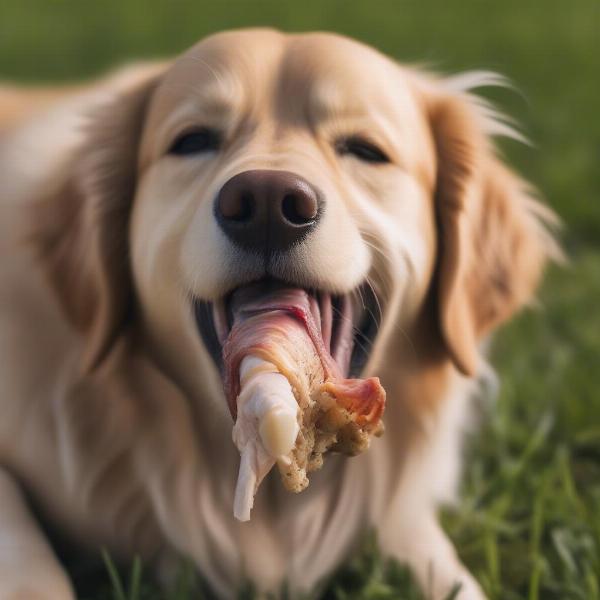Turkey necks for dogs have become a popular chew treat, praised for their nutritional benefits and ability to keep dogs entertained. But are they truly a safe and healthy option for your furry friend? This article delves into the pros and cons of feeding turkey necks to dogs, addressing common concerns and offering practical advice for incorporating them into a balanced diet.
The Benefits of Turkey Necks for Dogs
Turkey necks are a natural source of chondroitin and glucosamine, both beneficial for joint health, especially in older dogs or breeds prone to hip dysplasia. They are also packed with protein, contributing to muscle development and overall well-being. The chewing action required to consume a turkey neck helps clean teeth and massage gums, promoting good oral hygiene. Moreover, the act of gnawing on a satisfying chew can reduce anxiety and boredom in dogs, preventing destructive behaviors.
 Dog gnawing on a turkey neck
Dog gnawing on a turkey neck
Raw vs. Cooked: Which is Better?
The debate between raw and cooked turkey necks for dogs centers around safety and nutritional value. Raw turkey necks retain more nutrients, but they carry a risk of bacterial contamination, such as Salmonella. Cooking eliminates this risk but can reduce the nutritional content and make the bones more brittle, increasing the risk of splintering.
Potential Risks of Feeding Turkey Necks
While turkey necks offer numerous advantages, it’s essential to be aware of potential downsides. Large pieces can be a choking hazard, particularly for small breeds or puppies. Always supervise your dog when they are enjoying a turkey neck. Some dogs may experience digestive upset, especially if introduced to large quantities too quickly. Start with small portions and monitor your dog’s reaction.
How to Safely Feed Turkey Necks to Your Dog
Choose appropriately sized turkey necks for your dog’s breed and age. For raw turkey necks, source them from reputable butchers and handle them with care to avoid cross-contamination. If cooking, simmer or bake them until the meat is cooked through, but the bones are not brittle. Never fry turkey necks, as this can make them extremely hard and dangerous. Introduce turkey necks gradually into your dog’s diet to avoid digestive upset.
Are Smoked Turkey Necks Safe for Dogs?
can dogs eat smoked turkey necks often contain high levels of sodium and other additives that can be harmful to dogs. It’s generally best to avoid giving your dog smoked turkey necks. Opt for fresh or plainly cooked options instead.
Turkey Necks as Part of a Balanced Diet
Turkey necks should be treated as a supplemental treat, not a meal replacement. They should make up only a small percentage of your dog’s overall diet. Consult your veterinarian to determine the appropriate portion size for your dog’s specific needs.
Conclusion
Turkey necks can be a healthy and enjoyable treat for dogs when fed responsibly. By understanding the benefits and risks and following the guidelines outlined in this article, you can safely incorporate this nutritious chew into your dog’s diet, promoting their oral health, joint health, and overall well-being. Remember to always supervise your dog when giving them any chew treat and consult your veterinarian with any concerns.
FAQ
- Can puppies eat turkey necks? Yes, but they should be given smaller pieces appropriate for their size, and always under supervision.
- How often can I give my dog a turkey neck? Treats, including turkey necks, should not exceed 10% of your dog’s daily caloric intake.
- What should I do if my dog chokes on a turkey neck? Seek immediate veterinary attention.
- Are raw turkey necks better than cooked ones? Raw necks retain more nutrients, but cooked ones are safer regarding bacterial contamination.
- Can I give my dog frozen turkey necks? Frozen turkey necks can be a longer-lasting chew, but make sure they are fully thawed before giving them to a puppy.
- What are some alternatives to turkey necks for chewing? Bully sticks, rawhide alternatives (like sweet potato chews), and dental toys are good options.
- My dog has allergies; can I still give them turkey necks? If your dog has poultry allergies, avoid turkey necks. Consult your vet for alternative chew treat options.
ILM Dog is a leading international online resource dedicated to providing expert advice on dog care and wellbeing. We cover a wide range of topics from breed selection and puppy care to senior dog health, nutrition, training, and product recommendations. Whether you’re a seasoned dog owner or just starting your journey, ILM Dog is here to support you every step of the way. Contact us at [email protected] or +44 20-3965-8624 for expert guidance tailored to your dog’s unique needs. Visit us at ILM Dog for more valuable information on caring for your canine companion.